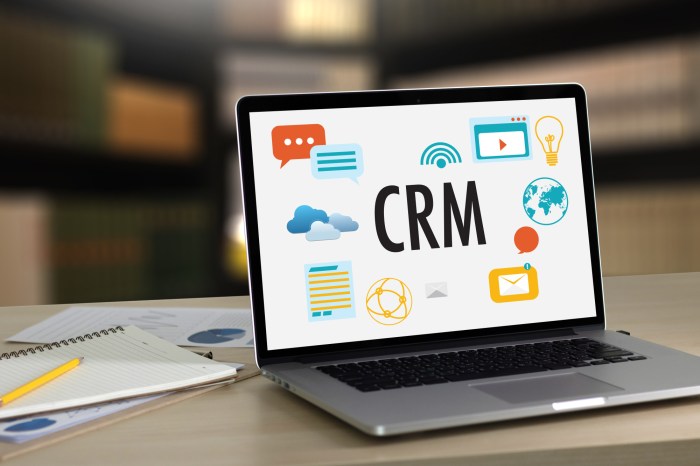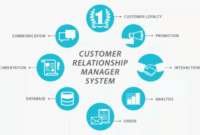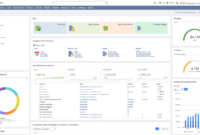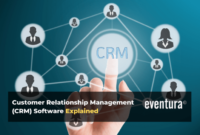CRM for small companies is more than just a buzzword; it’s a powerful tool that can transform how you manage customer relationships, driving growth and success. By implementing a CRM system, you can streamline operations, enhance customer service, and boost sales in ways you never thought possible.
Imagine having a centralized hub where you can track customer interactions, manage leads, personalize marketing campaigns, and gain valuable insights into your customer base. That’s the power of CRM, and it’s readily available to small businesses of all sizes.
The Importance of CRM for Small Companies
In today’s competitive business landscape, small companies face a unique challenge: building strong customer relationships while managing limited resources. This is where a Customer Relationship Management (CRM) system comes in. CRM is not just a tool; it’s a strategic approach that helps small businesses manage customer interactions, track customer data, and ultimately drive business growth.
Benefits of CRM for Small Businesses
A well-implemented CRM system can significantly enhance customer service, sales, and marketing efforts for small businesses. Here are some key benefits:
- Improved Customer Service:CRM systems provide a centralized platform for managing customer interactions, ensuring consistent and personalized service across all touchpoints. By having access to a complete customer history, businesses can better understand individual needs and provide tailored solutions.
- Enhanced Sales Performance:CRM helps sales teams streamline their processes by providing valuable insights into customer behavior, purchase history, and communication preferences. This allows for targeted sales strategies and effective lead nurturing, leading to increased conversion rates and revenue growth.
- Targeted Marketing Campaigns:CRM enables businesses to segment their customer base based on demographics, interests, and purchasing behavior. This allows for the creation of highly targeted marketing campaigns that resonate with specific customer groups, leading to higher engagement and conversion rates.
Examples of CRM Use in Small Businesses
Here are some practical examples of how small companies can leverage CRM to streamline operations and enhance customer engagement:
- A retail storecan use CRM to track customer purchases, preferences, and birthdays. This allows for personalized recommendations, loyalty programs, and targeted promotions, fostering stronger customer relationships.
- A service-based businesscan use CRM to manage appointments, track service history, and send automated reminders. This ensures efficient scheduling, improves customer satisfaction, and reduces missed appointments.
- An online storecan use CRM to capture customer data through website forms, track website activity, and send personalized email campaigns. This helps understand customer behavior, tailor marketing efforts, and increase sales conversions.
Choosing the Right CRM for Your Small Business
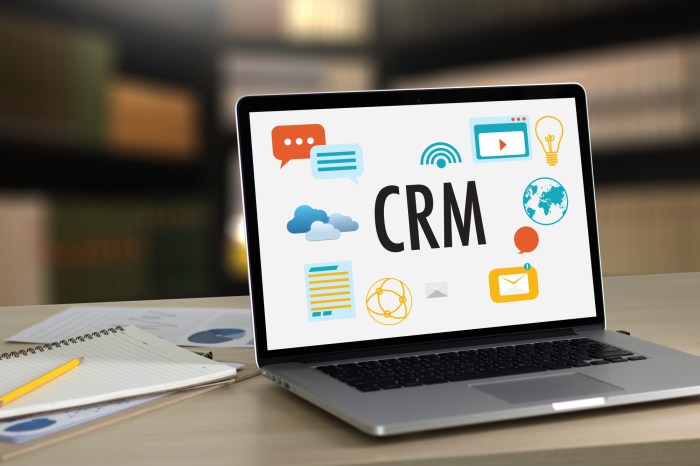
Selecting the right CRM for your small business is a crucial step towards efficient customer management and growth. A well-chosen CRM system can streamline your operations, improve customer satisfaction, and ultimately contribute to your bottom line.
Key Factors to Consider When Selecting a CRM System
Choosing the right CRM system involves evaluating various factors. Consider these key aspects to ensure the CRM aligns with your business needs and budget.
- Budget: CRM systems come with varying price points. Determine your budget for the initial purchase, monthly subscriptions, and any additional features or integrations you might require.
- Features: Identify the core functionalities you need, such as contact management, lead tracking, sales automation, marketing automation, and customer support. Match the CRM’s features with your specific business requirements.
- Scalability: As your business grows, your CRM should be able to adapt. Choose a system that can accommodate increased data volume, users, and complex processes.
- Integration Capabilities: Consider how well the CRM integrates with your existing software, such as email marketing platforms, accounting software, and social media tools. Seamless integration simplifies data flow and reduces manual data entry.
CRM Options for Small Companies
Several CRM options are available for small companies, each with unique strengths and weaknesses. Consider these popular options:
- Zoho CRM: Known for its comprehensive features, affordable pricing, and extensive integrations. Zoho CRM caters to various industries and offers customizable solutions.
- Pipedrive: A sales-focused CRM that prioritizes pipeline management and lead generation. Pipedrive is intuitive and user-friendly, making it ideal for sales teams.
- HubSpot CRM: A freemium CRM that offers a free plan for basic functionalities. HubSpot CRM is particularly strong in marketing automation and provides tools for inbound marketing campaigns.
- Salesforce Essentials: A scaled-down version of Salesforce, designed for smaller businesses. Salesforce Essentials offers core CRM functionalities at a lower cost.
- Freshworks CRM: A cloud-based CRM with a focus on customer service and support. Freshworks CRM provides features for managing customer interactions, resolving issues, and building relationships.
Essential Features for a CRM System
Regardless of the CRM you choose, it should include these essential features to maximize its impact:
- Contact Management: Store and manage customer information, including contact details, purchase history, communication records, and preferences.
- Lead Tracking: Capture and track leads from various sources, qualify them based on criteria, and manage their progress through the sales funnel.
- Sales Automation: Automate repetitive tasks, such as sending follow-up emails, scheduling appointments, and generating quotes, freeing up time for sales representatives.
- Reporting and Analytics: Gain insights into customer behavior, sales performance, and marketing effectiveness through customizable reports and dashboards.
- Customer Support Features: Manage customer inquiries, track support tickets, and provide efficient resolutions to enhance customer satisfaction.
Implementing a CRM System
Implementing a CRM system is not just about installing software; it’s about transforming how your business operates. A successful implementation involves careful planning, execution, and ongoing maintenance.
Data Migration
Data migration is the process of transferring your existing customer data from your current systems to the new CRM. This is a critical step, as accurate and complete data is essential for the CRM to function effectively. Here are some key considerations for data migration:
- Data cleansing:Before migrating, clean your data to ensure accuracy and consistency. This involves removing duplicates, correcting errors, and standardizing formats.
- Data mapping:Determine how your existing data fields map to the CRM’s fields. This ensures that information is transferred correctly.
- Data validation:After migration, validate the data to ensure it has been transferred accurately. This can involve comparing data sets or running data quality checks.
User Training
Training your team on how to use the CRM is essential for its successful adoption. Effective training ensures users understand the system’s functionality and can leverage it to improve their daily tasks.Here are some key elements of user training:
- Tailored training:Design training programs that cater to different user roles and skill levels. This ensures that everyone receives the information they need.
- Hands-on experience:Include hands-on exercises and simulations to give users practical experience with the CRM. This helps them learn by doing.
- Ongoing support:Provide ongoing support through FAQs, documentation, or dedicated help desks. This ensures that users have access to assistance when needed.
CRM Customization
Most CRM systems offer customization options to tailor them to your specific business needs. This can involve adding custom fields, workflows, or integrations.Here are some examples of CRM customization:
- Custom fields:Add custom fields to capture data specific to your industry or business processes. For example, a retail store might add a field to track customer purchase history.
- Workflow automation:Automate tasks and processes to streamline workflows. For example, you could set up automated email sequences for new customers or reminders for overdue invoices.
- Integrations:Integrate the CRM with other business applications, such as accounting software or email marketing platforms. This allows data to flow seamlessly between systems.
Integrating the CRM System
Integrating the CRM system with existing business processes and software is crucial for seamless data flow and improved efficiency. This involves mapping CRM functionality to existing workflows and ensuring data consistency across systems.Here are some key steps for integration:
- Identify integration points:Determine which systems need to be integrated with the CRM, such as accounting software, email marketing platforms, or customer support tools.
- Choose integration methods:Select the appropriate integration methods, such as API connections, data synchronization, or third-party tools.
- Test integrations:Thoroughly test integrations to ensure data flows correctly and that systems function as expected.
CRM Maintenance and Support
Once the CRM is implemented, it’s essential to have a strategy for ongoing maintenance and support. This ensures that the system remains up-to-date, secure, and performs optimally.Here are some key aspects of CRM maintenance and support:
- Regular updates:Keep the CRM system up-to-date with the latest software updates and security patches. This ensures optimal performance and security.
- Data backups:Regularly back up your CRM data to protect against data loss. This can be done manually or through automated backup solutions.
- User support:Provide ongoing user support through documentation, FAQs, or dedicated help desks. This ensures that users can resolve issues and maximize the CRM’s value.
Using CRM for Sales and Marketing
A CRM system can be a powerful tool for small businesses to boost their sales and marketing efforts. By centralizing customer information, automating tasks, and providing valuable insights, CRM helps businesses streamline their operations and achieve better results.
Improving Sales Performance
A CRM system can help small businesses improve their sales performance in several ways. It provides a comprehensive view of customer interactions, allowing sales teams to identify opportunities, prioritize leads, and close deals faster.
- Lead Tracking and Management:CRM systems track all interactions with potential customers, from initial contact to conversion. This provides a clear picture of each lead’s journey, allowing sales teams to nurture leads effectively and identify the most promising prospects.
- Sales Pipeline Management:CRMs visualize the sales pipeline, showing the progress of each deal through different stages. This helps sales teams understand the flow of opportunities, identify bottlenecks, and allocate resources efficiently.
- Sales Forecasting and Reporting:CRM systems generate reports on sales performance, providing insights into trends, conversion rates, and key performance indicators. This data helps businesses track progress, make informed decisions, and optimize their sales strategies.
Targeted Marketing Campaigns
CRM systems enable small businesses to create targeted marketing campaigns based on customer data and preferences. This helps businesses reach the right audience with the right message at the right time, maximizing campaign effectiveness.
- Customer Segmentation:CRMs allow businesses to segment their customer base based on demographics, purchase history, behavior, and other criteria. This enables businesses to create personalized marketing messages that resonate with specific customer groups.
- Personalized Communication:CRM systems facilitate personalized communication with customers, using their preferences and past interactions to tailor emails, offers, and other marketing materials. This creates a more engaging and relevant experience for customers, improving brand loyalty and customer satisfaction.
- Marketing Automation:CRM systems automate marketing tasks, such as sending email campaigns, scheduling social media posts, and managing lead nurturing workflows. This frees up marketing teams to focus on strategic initiatives and creative content creation.
CRM Features for Sales and Marketing
| Feature | Sales Application | Marketing Application |
|---|---|---|
| Contact Management | Storing and managing customer contact information, including phone numbers, emails, and social media profiles. | Segmenting customers based on contact information and creating targeted campaigns. |
| Lead Management | Tracking leads, prioritizing prospects, and managing the sales pipeline. | Nurturing leads through automated email sequences and personalized content. |
| Opportunity Management | Tracking sales opportunities, forecasting revenue, and managing deals. | Identifying and targeting potential customers based on their interests and needs. |
| Sales Reporting | Analyzing sales performance, identifying trends, and tracking key metrics. | Measuring campaign effectiveness, optimizing marketing strategies, and understanding customer behavior. |
| Marketing Automation | Automating follow-up emails, scheduling appointments, and sending personalized messages. | Creating automated email campaigns, managing social media posts, and nurturing leads. |
CRM for Customer Service and Support
In today’s competitive market, exceptional customer service is paramount for small businesses to thrive. CRM systems provide a powerful tool to elevate customer service by streamlining interactions, resolving issues efficiently, and fostering lasting relationships.
Centralized Customer Interaction Management
A CRM system acts as a central hub for all customer interactions, consolidating data from various channels like email, phone calls, live chat, and social media. This unified view provides a comprehensive understanding of each customer’s history, preferences, and past interactions.
By having all this information readily accessible, customer service representatives can quickly access relevant details, personalize interactions, and provide accurate and efficient support.
Automated Responses and Self-Service Options
CRM systems enable businesses to automate routine tasks and provide self-service options, freeing up customer service representatives to handle more complex inquiries. For instance, automated email responses can be set up to acknowledge incoming requests, provide initial troubleshooting steps, or direct customers to relevant resources.
Additionally, self-service portals can be integrated with the CRM, allowing customers to access frequently asked questions, knowledge base articles, and other helpful resources independently.
Personalized Support and Relationship Building
CRM systems empower businesses to provide personalized support tailored to individual customer needs. By analyzing customer data, businesses can identify patterns, preferences, and past interactions to personalize communication and support. For example, CRM can trigger automated birthday greetings, offer personalized recommendations based on past purchases, or provide proactive support based on identified issues.
These personalized touches demonstrate genuine care and foster stronger customer relationships.
Measuring CRM Success: Crm For Small Companies
To truly understand the value your CRM system brings, you need to measure its effectiveness. This involves tracking key metrics that reflect how well your CRM is helping you achieve your business goals.
Identifying Key Metrics
Several key metrics can provide insights into your CRM’s performance. These metrics fall into three main categories: customer engagement, sales performance, and customer satisfaction.
- Customer Retention Rate:This metric tracks the percentage of customers who continue to do business with you over a specific period. A higher retention rate indicates your CRM is effectively fostering strong customer relationships.
- Sales Conversion Rate:This metric measures the percentage of leads that convert into paying customers. A higher conversion rate suggests your CRM is helping your sales team effectively nurture leads and close deals.
- Customer Satisfaction Scores:These scores, often collected through surveys or feedback forms, gauge customer satisfaction with your products, services, and overall experience. Higher satisfaction scores indicate your CRM is helping you deliver excellent customer service.
- Lead Generation Rate:This metric tracks the number of new leads generated through your CRM-powered marketing campaigns. A higher lead generation rate suggests your CRM is effectively attracting potential customers.
- Average Deal Size:This metric measures the average value of deals closed through your CRM. A higher average deal size indicates your CRM is helping you secure larger and more profitable deals.
- Customer Lifetime Value (CLTV):This metric estimates the total revenue a customer is expected to generate over their relationship with your business. A higher CLTV indicates your CRM is helping you build long-lasting and profitable customer relationships.
Analyzing CRM Data, Crm for small companies
Once you have collected data on these key metrics, you need to analyze it to identify areas for improvement and optimize your CRM’s performance. This involves:
- Identifying Trends:Look for patterns and trends in your CRM data to understand how different factors are impacting your key metrics. For example, you might notice that customers who receive personalized email campaigns have a higher conversion rate.
- Comparing Performance:Compare your CRM performance over time to track progress and identify areas where you are seeing improvement. You can also compare your performance to industry benchmarks to see how you stack up against competitors.
- Segmenting Data:Segment your CRM data based on different customer demographics, purchase history, or other relevant factors. This allows you to identify specific customer groups that may be responding differently to your CRM strategies.
Reporting on CRM Results
Regularly reporting on your CRM results is essential to demonstrate the value of your CRM system to stakeholders and ensure ongoing support for your CRM initiatives. This involves:
- Creating Clear and Concise Reports:Use charts, graphs, and other visual aids to present your CRM data in a way that is easy to understand and interpret. Highlight key findings and insights.
- Focusing on Key Metrics:Don’t overwhelm stakeholders with too much data. Focus on the most important metrics that align with your business goals.
- Providing Actionable Recommendations:Don’t just present data; provide recommendations for how to improve your CRM strategy based on your findings.
- Sharing Reports Regularly:Establish a regular cadence for reporting on your CRM results, such as monthly or quarterly reports.
Conclusion
In the competitive landscape of today’s business world, CRM for small companies is not just a nice-to-have, it’s a must-have. By embracing the power of CRM, you can unlock a world of opportunities, build lasting customer relationships, and ultimately drive your business to new heights.
Popular Questions
What are the main benefits of using CRM for small companies?
CRM offers numerous benefits for small businesses, including improved customer service, increased sales efficiency, enhanced marketing effectiveness, better data management, and a deeper understanding of your customer base.
How much does it cost to implement a CRM system?
The cost of CRM systems varies widely depending on the features, functionality, and provider you choose. Many CRM solutions offer free or affordable plans specifically designed for small businesses.
How long does it take to see results from using CRM?
The time it takes to see results from CRM depends on factors like the complexity of your implementation, user adoption, and the specific goals you’re trying to achieve. However, many businesses start seeing positive outcomes within a few months of implementation.
Is CRM right for every small business?
While CRM can be beneficial for many small businesses, it’s not a one-size-fits-all solution. Consider your specific needs, budget, and resources to determine if CRM is the right fit for your company.

